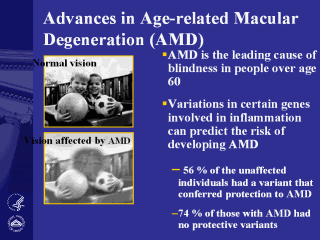| front |1 |2 |3 |4 |5 |6 |7 |8 |9 |10 |11 |12 |13 |14 |15 |16 |17 |18 |19 |20 |21 |22 |23 |24 |25 |review |
 |
Studies like the Age-related Eye Diseases Study
have given us hope that we can intervene in diseases such as age-related
macular degeneration (AMD) before irreversible vision loss occurs in our
older citizens. If people at risk for development of advanced Age-related
Macular Degeneration received supplements of vitamins C, E, beta-carotene,
and zinc, almost 25% would avoid advanced AMD and any associated vision loss
over the next 5 years. Three independent research groups representing NEI intramural scientists and extramural grantees have identified a common variant in complement factor H gene as a risk factor for developing AMD. The CFH gene is responsible for a protein that helps regulate inflammation in part of the immune system that attacks diseased and damaged cells. In certain patients with AMD, inflammation in the eyes may trigger a biological process leading to the disease. People whose genetic make-up includes a variant of the CFH gene are 7.4 times more likely to develop AMD. The study was based on whole genome analysis of participants from the NEI-sponsored Age-Related Eye Diseases Study, a major clinical study that closely followed nearly 5,000 patients with varying stages of AMD. Because these earlier studies have shown that genetic variations in complement pathway genes can cause a dysfunction in the inflammatory response that plays a central role in the pathology of AMD, researchers investigated further. The genes analyzed in this study — Complement Factor B (BF) and Complement Component 2 (C2) — contain the instructions to make proteins that activate the body’s immune defense against microbial infections. These defense responses are part of a system called the complement pathways. One genetic variant conferred an increased risk for AMD, while two genetic variants showed protection against developing this disease. These results, when analyzed in association with results linking AMD and genetic variants of Complement Factor H — a gene than contains the instructions to make a protein that inhibits the complement system — showed that 56 percent of the unaffected individuals had a variant that conferred protection to AMD while 74 percent of those with AMD had no protective variants. |